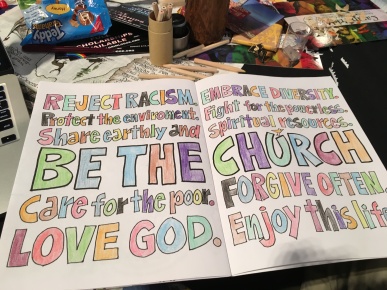
Do you remember that saying about pointing a finger? That while you are pointing your finger, you actually have three fingers pointing back at yourself?
There’s a truth in that, and an aspect of that truth that is part of the United Church of Christ. And, it ought to cause a fair amount of concern.
Near the end of General Synod this year, while we were debating the last set of resolutions on the floor—after the resolutions had been discussed, debated and altered during committee work—we found ourselves at an important moment of truth, our own truth. The issue was a resolution that had come from two separate resolutions that were combined in committee. The issues were: advocating for a minimum wage of $15.00 per hour, and a call to promote a living wage.
In the committee presentation and on the floor, we heard about the significance of holding employers and our communities to higher standards for how employees are paid. While concerns were raised regarding the differences around the country of what constitutes a “living wage” as well as the impact of a higher minimum wage on small businesses, the resolution seemed destined for passage. Many people had spoken passionately about the “justice” of a living wage in the United States.
And, then, someone approached the microphone to highlight a part of the resolution that hadn’t received much attention up to that point: the call to our local churches to look at our own patterns of compensation. How many of our churches are paying a living wage? How many of our churches are paying $15 an hour to secretaries, sextons, and other employees? And what about clergy?
We’re very good at telling other people what to do, but what about us? How are we living into the spirit of this resolution? How are we ourselves, in our local churches, witnessing to the God’s “justice” of a living wage? As we point our finger, do we recognize our own fingers pointed back at ourselves?
The murmur of assent could be heard through the hall. While not everyone was pleased with the “moment of truth,” it was an important moment. The United Church of Christ is indeed good at pointing fingers, while it isn’t so good at recognizing the fingers often pointed back at itself.
To be fair, there were resolutions at this year’s Synod that spoke directly to churches, associations, and to clergy. Examples of such resolutions: advocating cultural diversity training for authorized ministers, and “disability justice,” which involves calling for churches to “include persons with disabilities in their ministries and social justice witness.”
Still, some of the most impassioned items of business involved how the General Synod of the UCC should speak to other entities, or should speak up for certain groups of people—most of which involved the pointing of a communal finger of scorn. While I listened to the varieties of finger pointing, I was reminded of the words from Isaiah 58 (9b-10): “If you remove the yoke from among you, the pointing of the finger, the speaking of evil, if you offer your food to the hungry and satisfy the needs of the afflicted, then your light shall rise in the darkness and your gloom be like the noonday.”
As someone who has spent most of my ministry career paying only casual attention to what happens at Synod every other year, I can’t help but wonder about what was actually accomplished at Synod, as we delegates debated, discussed, wrestled and voted. In our “nonhierarchical” way of doing things, General Synod cannot speak for local churches, associations and conferences. General Synod speaks to the various ways in which we gather. So, there we are, pointing fingers while not fully acknowledging the fingers pointed back at ourselves.
I wonder about how we spoke to each other at Synod and how our witness at Synod speaks for itself. While there were some significant moments of speaking and listening (I’ll admit here that, though it was far from perfect, the back and forth of speaking and listening was notable), we still have a long way to go in living out our claim that “God is still speaking”—without incessantly turning to finger pointing.
God IS still speaking. The questions are: how well do we listen, especially in large groups? How well do we make room for the Spirit, especially when the hour is late or when we’ve been sitting in the same chairs for hours or when we largely agree on an issue, but there’s a lone brave voice that speaks up in disagreement? How do we witness ourselves to the claims for justice that appear to concern us so greatly? Are we able to acknowledge the fingers that point back to our own selves?
It may be that in our finger pointing we lose an important part of what it means for us to gather as church, as God’s people. Perhaps if we were to point less often, if we were to endeavor, in different ways, to satisfy the needs of the afflicted—to witness by example rather than by decree or statement— perhaps then we would find that our witness would be much more powerful, that in the midst of the gloom, we would be, even more wonderfully, part of the rising of God’s light instead.

